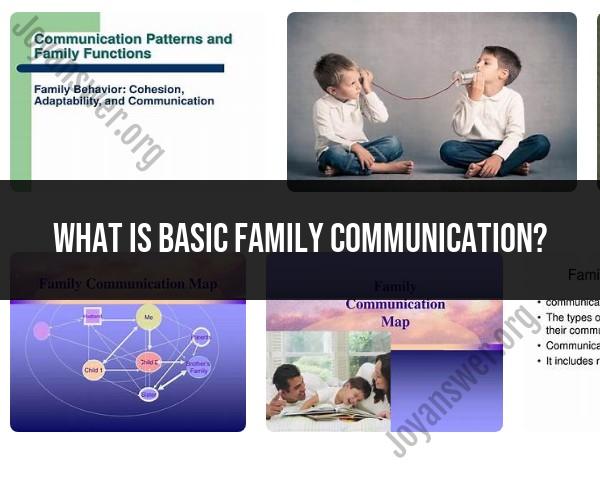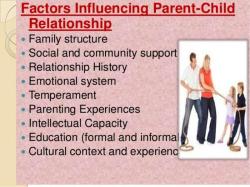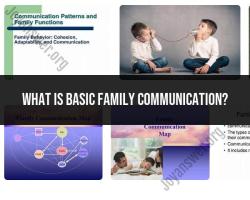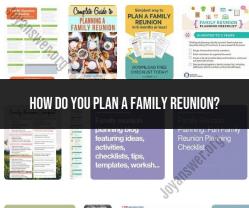What is basic family communication?
Basic family communication refers to the fundamental and essential ways in which family members interact, share information, express feelings, and connect with one another within a family unit. Effective family communication is a cornerstone of building strong connections and maintaining healthy relationships within the family. Here are some key elements of basic family communication:
Active Listening: Family members should listen attentively to each other when they speak. This involves giving one's full attention, showing empathy, and asking clarifying questions to ensure understanding.
Open and Honest Dialogue: Encouraging open and honest communication means creating an environment where family members feel safe sharing their thoughts and feelings without fear of judgment or reprisal. Honesty and transparency build trust within the family.
Expressing Emotions: It's important for family members to feel comfortable expressing their emotions and for other family members to acknowledge and validate these feelings. This can help prevent emotional bottling up and resentment.
Respectful Communication: Family members should communicate in a respectful manner, even when they disagree. This means avoiding disrespectful language, yelling, or using hurtful words.
Clear and Direct Communication: Being clear and direct in communication helps avoid misunderstandings and misinterpretations. It's essential for conveying expectations, needs, and boundaries.
Nonverbal Communication: Nonverbal cues, such as body language, facial expressions, and tone of voice, play a significant role in family communication. These cues can convey emotions and attitudes that may not be explicitly stated.
Problem Solving: Family communication should include discussing and resolving issues or conflicts in a constructive and collaborative manner. This can involve compromise and finding solutions that work for everyone.
Quality Time: Spending quality time together is a form of nonverbal communication that reinforces family bonds. This can include activities like family meals, outings, and shared experiences.
Supportive and Encouraging Communication: Family members should offer support and encouragement to one another, whether it's in pursuing goals, facing challenges, or celebrating achievements.
Empathy: Showing empathy means understanding and sharing the feelings of another family member. It helps build emotional connections and fosters understanding.
Boundaries: Clear communication of boundaries is crucial. Family members should respect each other's personal space, privacy, and individual needs.
Basic family communication is the foundation upon which more complex issues and topics are addressed. When families establish effective communication patterns, they are better equipped to handle challenges, conflicts, and changes in life while maintaining strong and healthy connections. This type of communication contributes to the emotional well-being of all family members and strengthens the family unit as a whole.
Basic Family Communication: Key Concepts and Practices
Family communication is the exchange of information, thoughts, and feelings between family members. It is an essential part of building and maintaining strong family relationships.
There are a few key concepts that are important for effective family communication:
- Active listening: Active listening is the process of paying attention to what someone is saying, both verbally and nonverbally. It also involves asking clarifying questions and reflecting back what you have heard to ensure understanding.
- Respect: It is important to respect each other's opinions, even if you disagree. This means listening to each other without judgment and avoiding personal attacks.
- Openness: Family communication should be open and honest. This means being willing to share your thoughts and feelings, and being receptive to hearing the thoughts and feelings of others.
- Clarity: When communicating with family members, it is important to be clear and concise. Avoid using vague language or sarcasm.
Building Stronger Connections with Family Communication
Family communication can help to build stronger connections between family members. Here are a few tips:
- Make time for communication: Set aside time each day to talk to your family members. This could be during meals, bedtime, or even just a few minutes before you go to bed.
- Be present: When you are communicating with your family members, be fully present. This means putting away your phone, turning off the TV, and giving them your full attention.
- Be supportive: Let your family members know that you are there for them and that you support them. This can be done through your words and actions.
- Be forgiving: Everyone makes mistakes. If you say something hurtful to a family member, be willing to apologize.
The Art of Effective Family Conversations
Effective family conversations are those that are open, honest, and respectful. They are also conversations that allow everyone to have a voice.
Here are a few tips for having effective family conversations:
- Choose a time and place where everyone can be comfortable and focused.
- Start by setting a ground rule that everyone will be respectful of each other's opinions, even if they disagree.
- Encourage everyone to participate in the conversation.
- Be an active listener.
- Avoid personal attacks and name-calling.
- Be willing to compromise.
Communication Skills for Nurturing Family Relationships
Communication skills are essential for nurturing family relationships. Here are a few tips:
- Be honest and open with your family members.
- Be supportive and understanding.
- Be willing to listen to your family members' needs and concerns.
- Be respectful of your family members' opinions, even if you disagree.
- Be willing to compromise.
Strengthening Family Bonds through Dialogue
Dialogue is a two-way conversation that involves listening to and understanding the other person's point of view. Dialogue is an essential part of strengthening family bonds.
Here are a few tips for using dialogue to strengthen family bonds:
- Be willing to share your thoughts and feelings.
- Be an active listener.
- Ask clarifying questions.
- Reflect back what you have heard to ensure understanding.
- Be respectful of your family members' opinions, even if you disagree.
Conclusion
Family communication is essential for building and maintaining strong family relationships. By following the tips above, you can improve your family communication skills and strengthen your family bonds.








